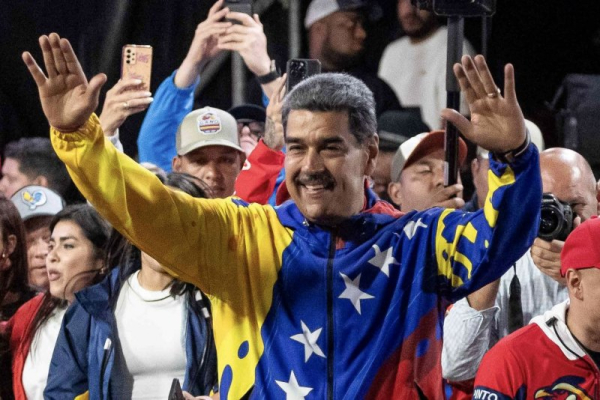

Venezuelan President Nicolas Maduro on Tuesday announced Christmas will start October 1 in Venezuela for a second straight year. File Photo by Ronald Pena/EPA
Venezuela will begin to observe the annual Christmas holiday on Oct. 1 for a second straight year, President Nicolas Maduro ordered.
Maduro announced the change via statements aired on Venezuela’s state channel, VTV, with an intent to improve the nation’s economy.
“It has gone very well for us — for the economy, for culture, for joy, for happiness,” Maduro said in the statement, as reported by Colombia One on Tuesday.
He added: “We are going to defend the right to happiness.”
The Venezuelan president said the government is going to act in the same way it has since it first moved up the start of the Christmas holiday in 2013, according to BNO News.
This year’s decision comes amid Venezuela’s ongoing political crisis. Maduro secured re-election in the contested July 28 vote, which opposition leaders and international observers denounced as fraudulent.
Analysts said the early Christmas decree serves as a distraction from allegations of electoral fraud and political repression.
The announcement also coincides with heightened tensions with Washington. The Trump administration expanded sanctions against Maduro’s government in early September, designating the “Cartel de los Soles” as a global terrorist group and imposing 25% tariffs on countries that import Venezuelan oil.
On Sept. 2, U.S. forces sank a Venezuelan vessel, which allegedly was tied to the Tren de Aragua gang, killing 11 people in a rare Caribbean military operation. The Venezuelan military since has used F-16 fighters to conduct close flybys of a U.S. Navy vessel in international waters.
The U.S. Justice Department has accused Maduro of leading the Cartel of the Suns, which is a drug-trafficking network that the DOJ said is led by senior officials in Venezuela.
Behind the festive rhetoric, Venezuelan families continue to struggle with deep economic challenges. The gap between the official exchange rate and real market prices complicates daily life, with inflation accelerating again in 2025.
According to the Venezuelan Observatory of Finance, monthly inflation jumped 26% in May, reaching 229% year-on-year and more than 105% accumulated through the first five months of the year.
The Central Bank stopped publishing official consumer price index data in October 2024. Independent economists say most transactions are already dollarized, with over 80% of payments carried out in U.S. currency.
Still, authorities insist businesses post prices at the official rate, currently around 155 bolivars per dollar, which strains merchants and consumers.
Meanwhile, wages remain among the lowest in the region. The minimum monthly salary in bolivars is worth only a fraction of the country’s food basket, which exceeded $500 in April and May — the equivalent of hundreds of minimum wages. Most households rely on government stipends and remittances to make ends meet.